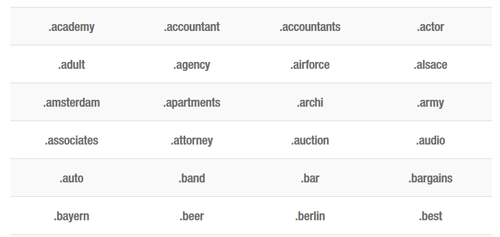Can the new gTLDs change your SEO game? Yes and No.

Top-level domains (TLDs) are a top-level domain category, historically comprising the most popular and the earliest domain names, such as .com, .org, .info, etc.
They were considered generic as opposed to the country-specific TLDs around the earliest days of the Internet. The term gTLD, however, is broader in scope and "the entire group of domains that do not have a geographic or country designation is still often referred to by the term generic TLDs."
The total number of gTLDs has been rather limited over the years. Each gTLD saw a huge number of websites picking up that extension -- .com, .org, and .net being a few cases in point.
They have a universal acceptability that few other domains possessed, primarily because they were among the first domains, and .com remains the most popular and widely used extension till date.
However, new kinds of gTLDs have been gaining popularity among website owners over the past few years and their use has been witnessing increasing acceptance.
The new generation of gTLDs
New generic TLDs provide website owners with a wide variety of extensions in stark contrast to the very specific number of extensions available for most of their history.
The list of new TLDs is long, but more importantly, intuitive, and therefore of interest to new businesses.
.academy, .bar, .berlin, .car, .coffee, .dog, .london, etc., are a few examples. The idea is to wear the name of your business or your location as a badge and include it in your website domain name. As a result, there is almost no dearth of new extensions available. Creative-minded folks are loving it.
The biggest advantage of new gTLDs and how it impacts SEO
Since .com is the most popular extension globally, it is difficult to find a domain name of our choice available. Almost anything we can imagine is taken.
With the rise in popularity of generic TLDs, new business owners who want their website to sound different or capture the essence of the business, there are more choices than ever.
For new businesses looking to set up a website, the use of gTLD is encouraged as it would make your site name memorable and help it stand out in a sea of similar-sounding websites, which in itself is a competitive advantage.
Now your brand new bakery need not be called nyc-bakery.com; you can instead opt for bakery.nyc.
With the help of a specific gTLD geared toward the nature of your business or the location of it, and specifically the kind of words that people intuitively make use of when searching for businesses, you open a new doorway to help people find you. Though it is indirect, this is a tremendous advantage for SEO.
Google has denied any direct SEO advantage
Studies into the matter have presented conflicting results, with some claiming that a business with a website name such as bakery.nyc will likely show up higher in SERPs triggered by keywords 'bakery' and 'nyc' than would a similar business with a website called bakery-nyc.com.
A search study from 2014 found that websites with .berlin domain on an average ranked a few hundred places higher than .com or .de websites. This was attributed to the SEO-friendliness of the new gTLD .berlin.
Another study found that new gTLDs were outperforming the.com versions in search results.
None of the studies has been conclusive, however.
Google itself has emphatically stated that there are no SEO advantages to the new TLDs and that they are treated the same as other TLDs regardless of the brand keywords they might contain.
There you have it, straight from the horse's mouth.
So what should a new business do?
Websites with new TLDs that rank very well have other attributes that make it so - a large number of backlinks from relevant sites, clever marketing campaigns, a quality product/service, etc. They happen to have a new gTLD but that does not have any bearing on the quality or the success of the website.
The principles of successful SEO remain the same, but a new gTLD can be of help.
Coffee.club has a certain ring to it, as opposed to coffee-club.com, which is way too general. If you are about to float a company or buy a domain, choosing a new gTLD would be a good idea. It would afford you greater choice, allow you to exercise creativity and won't cost you nearly as much as a .com extension.

For existing website owners who want to move to a new TLD, bear in mind there are no SEO advantages here. Just that an intuitive name, such as the hypothetical bakery.nyc, can top a solid SEO and marketing campaign. Everything else remains the same.
Have you ever thought of moving to a new TLD because it sounded fancy and closer to what you do or who you are as a business? Do you already own a new gTLD? How is it helping you with Google rankings? Please share your thoughts and experience in the comments!
Pete Peranzo is the CEO of Imaginovation, a full-service, turn-key digital solutions company serving Raleigh, NC and Charlotte, NC. He is a results driven individual with over 15 years in the IT and software industry. Pete's background in customer support is a driving factor in the company's long-term success and reputation. He has embedded customer service into the company's core culture, and feels that fast turnaround, great communication and high-quality support are keys to lasting business relationships. Follow him on Twitter @PetePeranzo.









